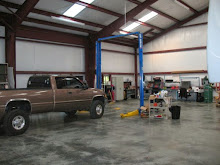Well folks, it has been a long time since I’ve taken the time to post to the blog. As usual I’ve done a number of things to keep busy but just haven’t been documenting them as much. We sold the 2005 Dodge Ram so that my wife could upgrade to a more comfortable vehicle. We now have a 2011 Infinti QX56. I was able to change the oil in it for the first time last month so that was exciting.
I plan to upgrade the steering box and shaft on the 2001 Ram this winter so stay tuned. I may post about it. The steering is so terrible on that truck I am often concerned about safety. Especially when towing! …
Speaking of safety – I was recently contacted by someone by the name of Brian Turner. He has a love for cars just like many of us and has been working hard to spread the word about harmful chemicals that are often found in classic cars. At his request I am posting his blog post right here and I thank Brian for his contribution!
----------------------------------------------------------------------------------
Hidden Dangers in Automobiles
Brian Turner
For lovers of cars, especially classic older models, they should be aware that there are cases where these vehicles contain hidden toxins. While this is not a prevalent threat, it is important that men and women educate themselves about what these substances are and what kinds of conditions they can potentially cause.
Air conditioners contain a substance called Freon that is essential to the functioning of the unit. Especially in older cars where the seals and vales might have degraded a bit, this should be checked out. For cars that are being sold or salvaged, professionals can look into this and, if needed, dispose of the Freon properly. Amateurs should be sure to avoid touching the compound or breathing it in in any manner.
Mercury can also be found in some components of cars and trucks, most notably thermostats and even fuses. The element is toxic when found in large enough quantities, and should be handled by an expert with the proper equipment and protective gear. Although it is most known as the basis of common household thermometers, it should always be handled with considerable care. For those who are restoring older cars, gloves and masks are probably a good idea when working with the thermostat and other components that regulate the overall temperature.
Though not as harmful unless they are taken in directly, antifreeze and even gas and oil must be watched carefully. For those that work on their cars outside of their own homes, leaking liquids can ultimately cover the driveway or the yard, where young children or pets can potentially consume them. Antifreeze must be carefully watched in this regard, as it is sweet tasting and attractive to toddlers who don’t know any better.
Asbestos, too, can be found in some parts of vehicles as insulation. Asbestos can lead to mesothelioma and other potentially serious conditions, so men and women should be quite careful with exposure to this substance. If they are restoring a car and are not quite sure how to deal with asbestos, they should always seek professional help. If they believe they have suffered some degree of exposure to the material, then they should seek medical advice from a trusted physician in the area.


This comment has been removed by a blog administrator.
ReplyDeleteNot all drivers are aware that some car parts contain asbestos but thanks for sharing, now we know.
ReplyDelete